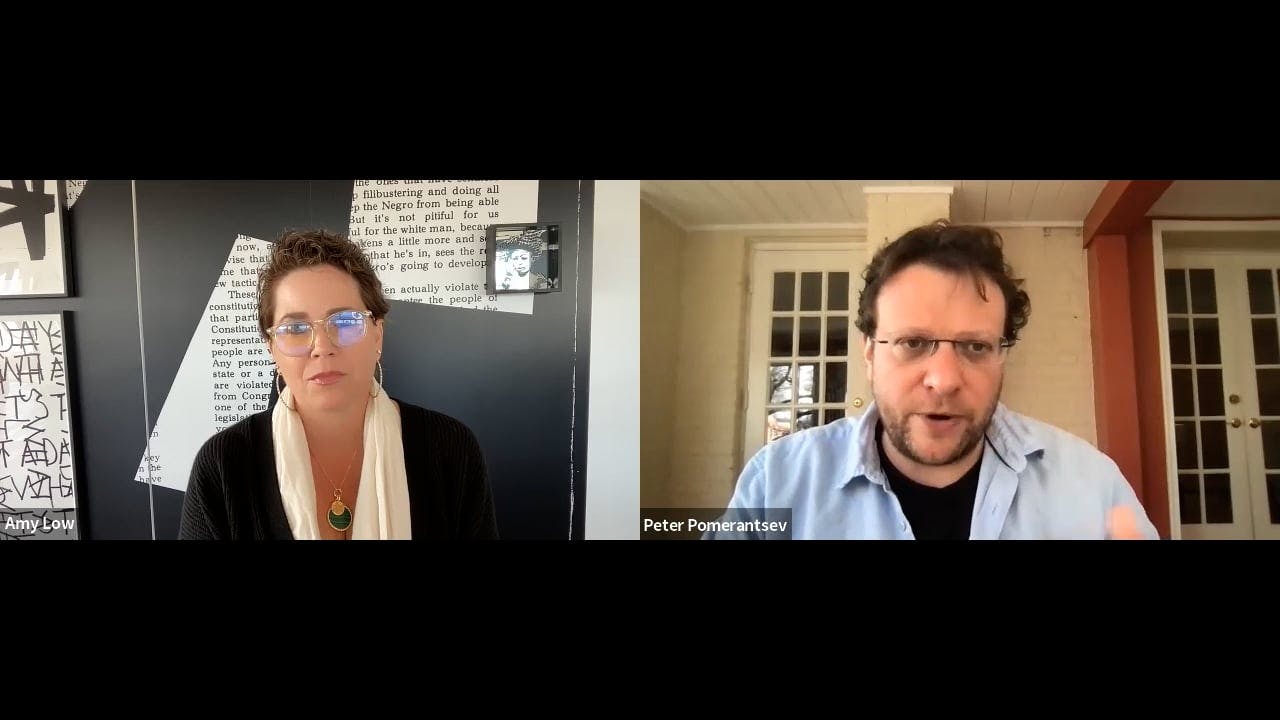
How misinformation spreads online—and what we can do about it
7 min read
Born in Kyiv when Ukraine was part of the Soviet Union, Peter Pomerantsev was just nine months old when his family was exiled to West Germany. His father, the broadcaster and poet Igor Pomerantsev, was arrested by the KGB and threatened with seven years' prison and five years' exile for giving his friends copies of Vladimir Nabakov and Aleksandr Solzhenitsyn novels.
“Russia's a very strange place where the dictators always go for the poets,” says Pomerantsev. “My father never wrote political poetry, but I grew up with that idea that self-expression is a deeply political act. That's partly where my interest in propaganda and freedom comes from.”
After growing up in London, Pomerantsev later attended film school in Moscow, and found himself working in entertainment TV—making reality shows and documentaries—while watching a propaganda system emerge in Russia. “Factual media was flooded with state-sponsored disinformation, seeding endless cynicism and conspiracy thinking,” he says. “The aim was to spread such deep doubt and division that debate became impossible.”
His first book, Nothing is True and Everything is Possible, charted this process. His second, This is Not Propaganda, tracked similar tactics across the world, showing how leaders, from the Americas to South Asia, have used them.
But, he soon asked himself: what's the point of justwriting about propaganda? So Pomerantsev turned his attention to solutions. At the London School of Economics, he co-founded Arena, a research project that explores how media can reach polarized and antagonistic audiences, using insights from Ukraine, Italy, Hungary, Germany and Sweden. He continues this work at Johns Hopkins University, surfacing insights to help in the U.S. and across the world.
Now, as an Emerson Collective Fellow, Peter is focusing on American history, and looking at how the media can help people across the political spectrum confront its complexities. Recently, he joined Emerson Collective Managing Director of Fellowships and Nonprofit Media Amy Low to explain his research on tactics to counter disinformation, and what his works suggests about the current crisis in Ukraine—and in America.

FELLOWS FRIDAY SERIES: Author and researcher Peter Pomerantsev discusses Putin’s attack on Ukraine, and how to counteract Russia’s use of state-sponsored disinformation to control media narratives.
Putin’s aim is to shift the axis of the world order and signal a new moment where authoritarian powers are in the ascendancy – the end of the American kind of century. He has done this over and over. He did it with Crimea. He did it in Syria. And then Ukraine is a much bigger case for various reasons.
A propagandist’s job is to understand audiences' anxieties and manipulate them. The Kremlin's tactic is to find wedge issues and get different bits of society to hate each other in a very strategic way – to inculcate these very aggressive models of identity which make democracy impossible. Essentially, the Kremlin spreads so much disinformation that people get confused and encased in conspiracy theories. People become so distrustful, they can't talk to each other.
A propagandist’s job is to understand audiences' anxieties and manipulate them.
Russia is a dictatorship, and America is a democracy. I think the difference between democracy and dictatorship is that dictatorships do “narrative.” They say, "This is history. Obey. If you don't fit into this history, off to the gulag you go!" Democracy is about the “public sphere,” which we talk about, but really struggle to define. It’s about listening to each other; it's about respecting the differences of people who also respect our differences.
But in terms of the rhetorical techniques and the way big TV channels are reinforced with online disinformation campaigns, it's very similar to what you see in parts of the U.S. You can take Sean Hannity and Dmitry Kiselyov, who is his equivalent in Russia, and they map onto each other. After all, America is a country where more than 40% of people think the 2020 election was stolen. Propaganda makes people so cynical about facts, that they basically say, "Oh, you can't trust anyone. Therefore, I'm going with an authoritarian leader who will protect me and information that reaffirms my emotions and locks me into a paranoid identity model."
Of course, in Russia, people have more of an excuse for not dissenting, because there is a punishment system. You can be imprisoned for 12 years if you mention the word “war.” And journalists are killed all the time in Russia. It's a very dangerous profession. So that's the big difference.
The problem in America is a lack of incentives to fight misinformation. The big TV channels, who should really be taking more responsibility on this, are doing the exact opposite because that's the easy way to make money. The social media algorithms are biased too, because the easiest way to create engagement is to lean into identity polarization. I'd like to be as nuanced as possible in my critique of social media companies, but they were not designed with a Tocquevillian idea of democracy in mind, frankly.
So the incentives are missing. The question is how do we create this whole flotilla of civic media that are doing this every day, who get up in the morning going, "How do I help cultivate a democratic discourse in a public sphere?" The question becomes, “Is there a narrative that can bring us together?”
How do we talk about all the darknesses of our history and confront it and communicate evidence to groups that are knowledge-resistant, and do it in a way that facilitates a conversation about a common future?
In Ukraine we asked, how do you deal with disinformation and propaganda in countries where history is genuinely complicated, genuinely divisive. This history has been exploited very cynically by malign forces in the U.S., especially on the right, and in Ukraine, by Russia. So, how do we talk about all the darknesses of our history and confront it and communicate evidence to groups that are knowledge-resistant, and do it in a way that facilitates a conversation about a common future?
I believe our job as journalists and artists is to understand people’s anxieties and fears and instabilities and insecurities and bring that all into public speech. That's the great competition we’re in with propagandists: I sometimes jokingly compare it to the difference between a cult leader and a psychotherapist. Both of them are trying to work out what's wrong with people. But the cult leader, like the propagandist, wants to exploit it. Good journalism and arts and media, in the broader sense, want to deal with it.
In Ukraine our big insight was that it’s fine for people to disagree if those disagreements are used not as a wedge but to find solid ground to build on. The question became: what are the lessons from history about what sort of future we're going to build?
This, by the way, is what Putin completely misunderstood about Ukraine. What he hasn’t realized is that actually Ukrainian society is very solutions-orientated. Ukrainians will work together for a common goal if they need to. Putin thought he would roll in and the country would be so divided it would just crumble or descend into civil war. But there's incredible unity, incredible understanding that despite any divides there are between the east and west of the country—which are not unlike the divides between north and south in America—those things are actually in the past. It's the future that matters.